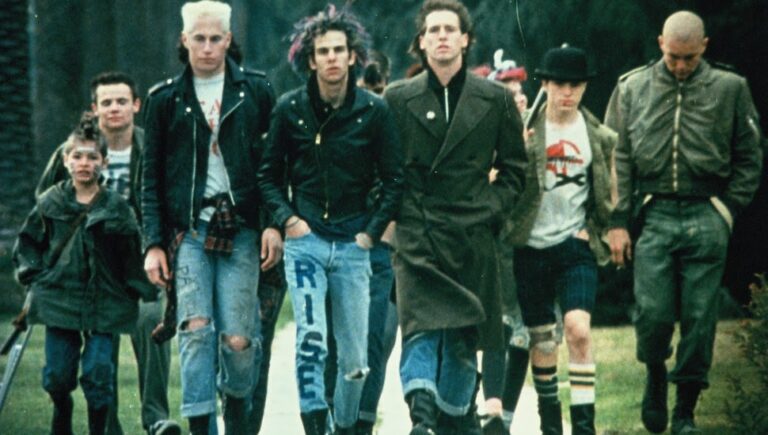In the spirit of International Women’s Day we’re taking a look at eight of our favourite films by women filmmakers to watch today, and every day.
Look, I’m aware that penning a listicle about great women directors on International Women’s Day feels like an exercise in hollow virtue signalling. I promise you it’s not. It’s actually an exercise in me being an annoying, opinionated brat who loves to berate people with movie recommendations.
Here are nine films, by women filmmakers, that have moved me. I hope they move you too.
The Lost Daughter (2021) dir. Maggie Gyllenhaal
The Lost Daughter is Maggie Gyllenhaal’s first time in the director’s chair, and she certainly didn’t disappoint. Showing she can do much more than be a hugely successful actress, Gyllenhaal has received an Oscar nom for best-adapted screenplay for The Lost Daughter, with the gong to be decided later this month.
The Lost Daughter is a psychological drama film that’s based on the 2006 book of the same name. The sorry follows a women on a beach vacation with her daughter, before things take a confronting and dark turn.
Girlhood (2014) dir. Céline Sciamma
Love Film & TV?
Get your daily dose of everything happening in music, film and TV in Australia and abroad.
The most fun, accessible film in the French auteur’s cannon. Girlhood is a coming-of-age film about a gang of girls from the housing projects of Paris. It’s a touching portrait of the strange power of female friendship that doesn’t hold back on the grit, grime and unpleasantries of being a teenage girl. Girls can be violent, and mean, and downright terrifying!
There’s one scene in particular soundtracked by Rihanna’s ‘Diamonds’ that I’m not going to attempt to explain but just know that you will feel… so much.
Le Bonheur (1964) dir. Agnes Varda
The mother of new wave obviously needs no introduction but I think Le Bonheur is an overlooked film in her trove of masterpieces. There is a kind of uniquely feminine melancholy in this detached, cryptic story of a seemingly perfect marriage in collapse after infidelity. Female subjectivity is brought to the forefront.
It’s also just really fucking beautiful to look at.
Harlan County USA (1976) dir. Barbara Kopple
Barbara Kopple’s heartwrenching, powerful documentary about a coal miners strike in a small Kentucky Town in 1973. Harlan County USA will make you want to bang your head against the wall in dismay over how unjust and cruel this world can be.
Losing Ground (1982) dir. Kathleen Collins
Intelligent, lyrical, funny — Kathleen Collins’ Losing Ground is one of the first feature films directed by an African American woman. The intimate character study hones in on the marriage between a professor of philosophy stifled by the restraints of academia and her freewheeling painter husband.
Helmed in 1982, Losing Ground did not recieve a theatrical premiere until 2015 at the Film Society of Lincoln Center, and remained largely unseen until that point. Devastatingly, Collins died of cancer in 1988 at just 46. Losing Ground is the only feature she lived to make.
Mustang (2015) dir. Deniz Gamze Ergüven
Mustang feels like a more imperative sister film to Sofia Coppola‘s 1991 debut, The Virgin Suicides. Set in a coastal town in northern Turkey, Mustang turns its gaze on five charming young sisters that become imprisoned in their own home, cut off from the outer world at the height of teen angst and sexual awakening.
Fish Tank (2009) dir. Andrea Arnold
Bleak, human, heartbreaking and hopeful — Andrea Arnold’s Fish Tank follows the relationship between an isolated, violent 15-year old (played by the stellar Katie Jarvis) and her mothers new boyfriend (played by the deliriously sexy Michael Fassbender). It’s grim social-realism that harks back to the work of Ken Loach.
Tiny Furniture (2010) dir. Lena Dunham
Whatever, Lena Dunham is an exceptionally funny, gifted, self-aware writer and that is the hill I will die on. Girls is one of the greatest comedy series of the decade and Dunham’s debut film Tiny Furniture, is a satisfying glimpse into her creative journey.
It’s got everything you want from Dunham production, privileged, art-leaning, insufferable millenials at a standstill. No one does it better.
Suburbia (1983) dir. Penelope Spheeris
God fucking bless Penelope Spheeris, a true punk savant. Suburbia is the essence of Spheeris’ practice. A rowdy, empathetic story of a bunch of street punks just trying to get by. There’s also a feature from Red Hot Chili Peppers’ Flea.
Daughters of the Dust (1991) dir. Julie Dash
Elegant, and arresting — a masterclass in mood. Julie Dash’s Daughters of The Dust is a sumptuous paen of a multigenerational family in the Gullah community and their connection to cultural heritage amid a potential migration. The plot is loose but the feeling is eternal.

































